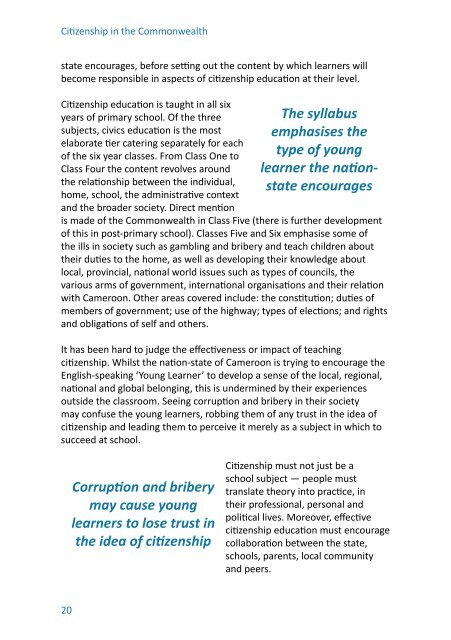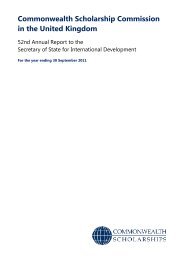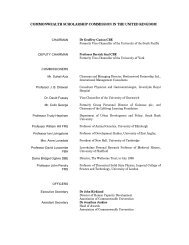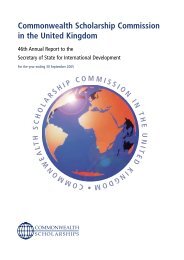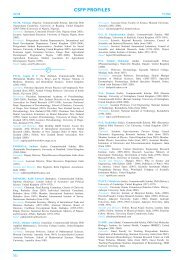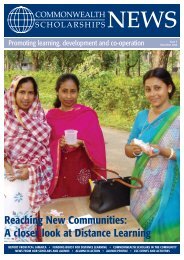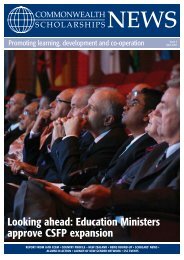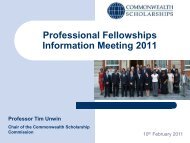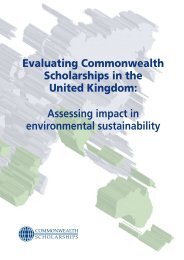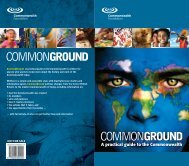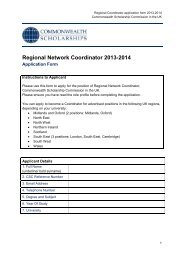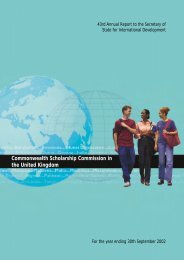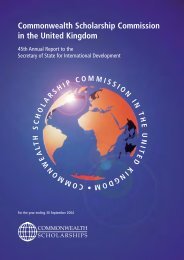Citizenship and the Commonwealth The Active Commonwealth ...
Citizenship and the Commonwealth The Active Commonwealth ...
Citizenship and the Commonwealth The Active Commonwealth ...
You also want an ePaper? Increase the reach of your titles
YUMPU automatically turns print PDFs into web optimized ePapers that Google loves.
<strong>Citizenship</strong> in <strong>the</strong> <strong>Commonwealth</strong>state encourages, before setting out <strong>the</strong> content by which learners willbecome responsible in aspects of citizenship education at <strong>the</strong>ir level.<strong>Citizenship</strong> education is taught in all sixyears of primary school. Of <strong>the</strong> threesubjects, civics education is <strong>the</strong> mostelaborate tier catering separately for eachof <strong>the</strong> six year classes. From Class One toClass Four <strong>the</strong> content revolves around<strong>the</strong> relationship between <strong>the</strong> individual,home, school, <strong>the</strong> administrative context<strong>and</strong> <strong>the</strong> broader society. Direct mention<strong>The</strong> syllabusemphasises <strong>the</strong>type of younglearner <strong>the</strong> nationstateencouragesis made of <strong>the</strong> <strong>Commonwealth</strong> in Class Five (<strong>the</strong>re is fur<strong>the</strong>r developmentof this in post-primary school). Classes Five <strong>and</strong> Six emphasise some of<strong>the</strong> ills in society such as gambling <strong>and</strong> bribery <strong>and</strong> teach children about<strong>the</strong>ir duties to <strong>the</strong> home, as well as developing <strong>the</strong>ir knowledge aboutlocal, provincial, national world issues such as types of councils, <strong>the</strong>various arms of government, international organisations <strong>and</strong> <strong>the</strong>ir relationwith Cameroon. O<strong>the</strong>r areas covered include: <strong>the</strong> constitution; duties ofmembers of government; use of <strong>the</strong> highway; types of elections; <strong>and</strong> rights<strong>and</strong> obligations of self <strong>and</strong> o<strong>the</strong>rs.It has been hard to judge <strong>the</strong> effectiveness or impact of teachingcitizenship. Whilst <strong>the</strong> nation-state of Cameroon is trying to encourage <strong>the</strong>English-speaking ‘Young Learner’ to develop a sense of <strong>the</strong> local, regional,national <strong>and</strong> global belonging, this is undermined by <strong>the</strong>ir experiencesoutside <strong>the</strong> classroom. Seeing corruption <strong>and</strong> bribery in <strong>the</strong>ir societymay confuse <strong>the</strong> young learners, robbing <strong>the</strong>m of any trust in <strong>the</strong> idea ofcitizenship <strong>and</strong> leading <strong>the</strong>m to perceive it merely as a subject in which tosucceed at school.Corruption <strong>and</strong> briberymay cause younglearners to lose trust in<strong>the</strong> idea of citizenship<strong>Citizenship</strong> must not just be aschool subject ― people musttranslate <strong>the</strong>ory into practice, in<strong>the</strong>ir professional, personal <strong>and</strong>political lives. Moreover, effectivecitizenship education must encouragecollaboration between <strong>the</strong> state,schools, parents, local community<strong>and</strong> peers.20


